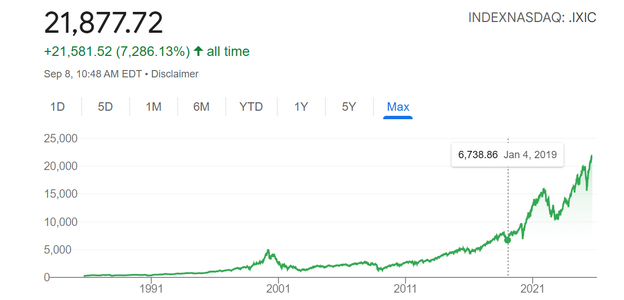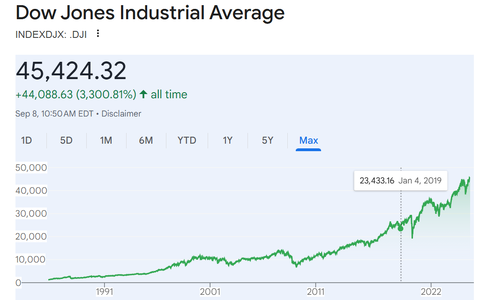Navigation
Install the app
How to install the app on iOS
Follow along with the video below to see how to install our site as a web app on your home screen.
Note: This feature may not be available in some browsers.
More options
You are using an out of date browser. It may not display this or other websites correctly.
You should upgrade or use an alternative browser.
You should upgrade or use an alternative browser.
Economic News
- Thread starter nycfan
- Start date
- Replies: 4K
- Views: 201K
- Politics
- Messages
- 39,152


‘The Conjuring: Last Rites’ Opens With $83 Million For Best Horror Opening Of 2025 So Far
The new installment in the “Conjuring” franchise had the series’ best opening weekend to date.
 www.forbes.com
www.forbes.com
“… Despite a less-than-stellar year for box office sales, “The Conjuring: Last Rites” joins one of several horror films making headlines for unexpected success. In April, “Sinners,” the new original film from “Black Panther” and “Creed” director Ryan Coogler, opened with $48 million after receiving high praise from audiences and critics. “Final Destination: Bloodlines,” the sixth installment in its own long-running series, opened with $51.6 million in May. Finally, in August, Zach Cregger’s “Weapons” grossed $43.5 million during its opening weekend. With an $83 million opening weekend, “The Conjuring: Last Rites” clearly outperformed the other major horror hits for initial ticket sales. It remains to be seen if it can keep up this demand and keep outpacing the other horror hits overall.
“Sinners” proved to be a major hit in the U.S., grossing a total of $278.5 million at the domestic box office before leaving theaters, but was less of a hit internationally, grossing just over $88 million internationally for a combined $366.6 million. “Final Destination: Bloodlines” took home $138.1 million at the domestic box office, but grossed more than $307.4 million worldwide. “Weapons,” which is still playing in some theaters, has grossed a total of $139.1 million domestically before factoring in all of this weekend’s sales, according to Box Office Mojo data.…
… The second biggest movie at the box office over the weekend wasn’t a holdover blockbuster or a new release—it was “Hamilton,” the filmed version of Lin-Manuel Miranda’s blockbuster musical originally released for streaming on Disney+ in 2020 during the COVID-19 pandemic.…” [Jaws was #2 last weekend!
——
I am lifetime horror movie buff but not sure this is great news for the movie theater industry … or maybe for our culture.
lawtig02
Legend of ZZL
- Messages
- 5,735
I have a hard time grouping Sinners with other horror movies. That thing was a masterpiece.

‘The Conjuring: Last Rites’ Opens With $83 Million For Best Horror Opening Of 2025 So Far
The new installment in the “Conjuring” franchise had the series’ best opening weekend to date.www.forbes.com
“… Despite a less-than-stellar year for box office sales, “The Conjuring: Last Rites” joins one of several horror films making headlines for unexpected success. In April, “Sinners,” the new original film from “Black Panther” and “Creed” director Ryan Coogler, opened with $48 million after receiving high praise from audiences and critics. “Final Destination: Bloodlines,” the sixth installment in its own long-running series, opened with $51.6 million in May. Finally, in August, Zach Cregger’s “Weapons” grossed $43.5 million during its opening weekend. With an $83 million opening weekend, “The Conjuring: Last Rites” clearly outperformed the other major horror hits for initial ticket sales. It remains to be seen if it can keep up this demand and keep outpacing the other horror hits overall.
“Sinners” proved to be a major hit in the U.S., grossing a total of $278.5 million at the domestic box office before leaving theaters, but was less of a hit internationally, grossing just over $88 million internationally for a combined $366.6 million. “Final Destination: Bloodlines” took home $138.1 million at the domestic box office, but grossed more than $307.4 million worldwide. “Weapons,” which is still playing in some theaters, has grossed a total of $139.1 million domestically before factoring in all of this weekend’s sales, according to Box Office Mojo data.…
… The second biggest movie at the box office over the weekend wasn’t a holdover blockbuster or a new release—it was “Hamilton,” the filmed version of Lin-Manuel Miranda’s blockbuster musical originally released for streaming on Disney+ in 2020 during the COVID-19 pandemic.…” [Jaws was #2 last weekend!]
——
I am lifetime horror movie buff but not sure this is great news for the movie theater industry … or maybe for our culture.
superrific
Master of the ZZLverse
- Messages
- 11,933
Bessent knows that a quarter point ain't gonna loosen anything right now, and even in the best scenario monetary policy takes about 4-6 months. So maybe by February we will start to see something. By then the situation will be dire.
- Messages
- 8,132
1) Really, your boss kept claiming that he could do it all on day one, that's basically snapping his fingers.BESSENT: It's been a couple of months. We can't snap our fingers and have factories built
WELKER: The economy did add nearly 500,000 manufacturing jobs under President Biden
BESSENT: Most of the jobs created under the Biden administration went to illegal aliens
2) So wish people would have listened.
3) Bullshit. Bullshit. Bullshit.
- Messages
- 138
Are the markets whistling by the graveyard, or am I being overly influenced by my negative reaction to Federal economic choices?
I'd really like to see the survey data that backstops the claim that new jobs are predominately going to native born workers. My guess that manufacturing job gains in the past going to illegal workers (as opposed to foreign-born workers) is an assumption rather than backed by survey data.
doctor_octopus
Exceptional Member
- Messages
- 145
This is what terrifies me, because I think the damage done to the country by the administration makes a recovery from any downturn far less predictable than in the past.Are the markets whistling by the graveyard, or am I being overly influenced by my negative reaction to Federal economic choices?
doctor_octopus
Exceptional Member
- Messages
- 145
I mean, I don't know how it goes in Hungary. Do you put your 401k into the Hungarian markets? Can you trust Hungarian market data?
sringwal
Iconic Member
- Messages
- 2,174
Don't get me wrong, I have benefited hugely from this period of growth (although if I invested more in stocks and less in comics, I'd be in a significantly better place financially). But, the implications behind why stocks are behaving the way they are... Yes, I know, part of it is smarter algorithms used by stockbrokers. And part of is that the rise of the crypto currency era is having some really odd reverberations on the stock market, but I can't help but feel like I am living through a giant ponzi scheme.
sringwal
Iconic Member
- Messages
- 2,174
I don't know, but I also don't know that it matters. The best thing to do with stocks is really to not overthink them too much, and just let the money ride (at least within the comfort of a portfolio). I've always argued that - should the stock market go flat to the degree that it destroys professional portfolios - it will be the least of our worries. At that point, everyone is fucked, least of all the people wealthy enough to invest.I mean, I don't know how it goes in Hungary. Do you put your 401k into the Hungarian markets? Can you trust Hungarian market data?
doctor_octopus
Exceptional Member
- Messages
- 145
Right - that's been the case as long as the American system has been more or less predictable. All those base understanding about decision makers, general monetary policy, etc. have since been thrown out the window, and have been broken in such a robust way to potentially affect how the entire world uses the US markets. That's my worry. I've never had to overthink before, because we all agreed that a working market based on growth, etc. was in our interest. Kinda like we used to all think vaccines were in our interest, and now we need to worry about effing MEASLES.I don't know, but I also don't know that it matters. The best thing to do with stocks is really to not overthink them too much, and just let the money ride (at least within the comfort of a portfolio). I've always argued that - should the stock market go flat to the degree that it destroys professional portfolios - it will be the least of our worries. At that point, everyone is fucked, least of all the people wealthy enough to invest.
- Messages
- 3,831
do these folks not realize that we are in the resurgence of a golden economy that is WINNING !!!
- Messages
- 39,152
Trump has been making one version of this claim for a while, cherry-picking and conflating data:I'd really like to see the survey data that backstops the claim that new jobs are predominately going to native born workers. My guess that manufacturing job gains in the past going to illegal workers (as opposed to foreign-born workers) is an assumption rather than backed by survey data.

Despite Trump's claims, data shows migrants aren’t taking jobs from Black or Hispanic people
Trump, who often uses anti-immigrant rhetoric, has referred during his campaign to immigrants he says are taking “Black jobs” and “Hispanic jobs.” But government data show immigrant labor contributes to economic growth and provides promotional opportunities for native-born workers.

Trump’s dubious claim on native-born Americans’ job losses
During a recent campaign rally, former President Donald Trump amplified a growing argument among some Republicans that f
“… But so far, economists on both sides of the aislesay, they have seen no evidence that American-born workers are picking up jobs vacated by immigrants. They also say figures for native- and foreign-born workers should not be used to gauge the current state of the labor force.
“Looking at the number of native-born workers is not the correct way to read the jobs report,” said Jed Kolko, a senior fellow at the Peterson Institute for International Economics and a former Commerce Department economist.
… The number of immigrants working in the United States has declined this year, economists agree.
… What is clear, though, is the share of immigrants with jobs has fallen in the past year, from 64.1 percent to 63.4 percent in July. The share of native-born people with jobs also has fallen, though the declines have been less pronounced….
The funky math behind counts of native-born workers
Looking at BLS-reported counts for July, it appeared that more than 2 million native-born workers had joined the labor force over the past year. The number of foreign-born workers, meanwhile, appeared to have fallen by 237,000.…
But BLS and census officials warn against using that data to draw conclusions about population counts — or comparing it with figures from previous years. Doing so would be “a multiple-count data felony,” Kolko wrote this past week.
One big reason is that the data is hemmed in by a population estimate set by the Census Bureau in January, before anyone had any idea how immigration enforcement was going to play out.
Basically, the number of foreign-born and native-born workers have to add up to a total based on the census estimate, according to several economists consulted by The Post. As a result, any drop in foreign-born workers artificially boosts the number of native-born workers reported each month.
Although immigration has declined significantly this year, this isn’t being accurately reflected in workforce counts, said Wendy Edelberg, a senior fellow at the Brookings Institution.
The native- and foreign-born data in question comes from the Current Population Survey, a monthly undertaking by the Census Bureau, which collects information from 60,000 U.S. households, with members responding to questions over the phone or in in-person interviews. Their answers are adjusted statistically to reflect trends in the broader population.
One question the census asks: whether they are native-born or foreign-born.
“If there’s a sudden drop in immigration, or if fewer foreign-born residents respond to the survey, then, by design, the number of native-born workers would almost certainly go up,” Kolko said. “The way the calculation is set up, it’s not like you can lower the population of foreign-born workers without raising the population of native-born.”
As an extreme illustration, Kolko said that if the entire foreign-born population vanished at the end of July, this dataset would show the population of native-born residents skyrocketing by tens of millions of people.
Self-reporting of foreign-born status
In addition, the government’s data surveys rely on self-reporting. Economists note that immigrants nervous about their status could be reporting that they are native-born, which could also skew the numbers.…”BillOfRights
Iconic Member
- Messages
- 1,454
The U.S. could tumble into recession before seeing Trump’s promised golden age
The U.S. economy is at risk of entering a recession before President Trump’s promised golden age, with weak job growth and high inflation blamed on his policies.
—> https://wapo.st/45TW0cA
“… Whether you blame President Donald Trump’s unorthodox tariff and immigration policies or a slow-footed Federal Reserve Chair Jerome H. Powell, the federal government is not doing the economy any favors these days.
The United States began the year having grown at an annual rate of 2.4 percent in the final three months of 2024. Hiring was robust: employers added 323,000 jobs in December.
Fast forward to today and the news is less cheery. On Friday, the Bureau of Labor Statistics said the economy added only 22,000 jobs in August, meaning the labor market has basically stalled since the president kicked off his historic “Liberation Day” tariff offensive in April. Some on Wall Street are mulling the likelihood of a recession.
… Administration officials dismiss that possibility out of hand. But, outside of recessionary periods, the U.S. has not seen hiring this weak relative to the size of the economy in more than 60 years, Jason Furman, a former adviser to President Barack Obama, posted on X.
Trump and his advisers were quick to point the finger at the Fed or the BLS while urging Americans to be patient. In an interview with CNBC, Commerce Secretary Howard Lutnick said the economy could dazzle again in as soon as “six months.”
The president himself began laying the groundwork for that argument one day earlier, saying that “in a year from now,” the employment picture will be brilliant, thanks to new investments in artificial intelligence and other marvels….”
BillOfRights
Iconic Member
- Messages
- 1,454
Share:


